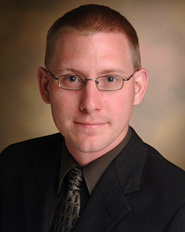
Alan Theisen (b. 4 October 1981; Port Huron, Michigan) is a Ph.D. graduate assistant in the Department of Music Theory at the Florida State University.
Composing since the age of sixteen, he has produced a steadily growing body of work distinguished by its musical energy and concentration of expression.
Representative works by Theisen include a Sonata for Alto Saxophone and Piano, Variations on a Theme of Gretchaninov, Eclogue for flute, and the Concerto for Alto Saxophone and String Orchestra (premiered by soloist Lawrence Gwozdz and the Szczecin Philharmonic in 2004). Recent compositions and commissions include Ritorno for flute and cello and a Triple Concerto. Noted composer Dimitri Terzakis commends Theisen's oeuvre as being "the product of a unique talent."
As a saxophonist, Theisen has toured the United States and Canada with the Sax-Chamber Orchestra, performing at two World Saxophone Congresses (Montreal - 2000, Minneapolis - 2003). He studied the instrument with internationally-recognized performer Lawrence Gwozdz and participated in masterclasses with famed saxophone pioneer Jean-Marie Londeix. No stranger to the podium, Theisen has been a guest conductor with several ensembles.
In an effort to showcase both his own original compositions and pieces by other contemporary composers, he founded the Intégrales New Music Festival in 2005. Now an annual event, Intégrales NMF features world-premiere performances by nationally recognized musicians. Intégrales has expanded to include musical collaborations with artists, authors, and dancers.
Theisen wrote his undergraduate thesis on György Ligeti's Piano Etudes, and has authored several papers on topics including Elliott Carter, film editing, composition as analysis, and Michael Brecker.
Other interests include mathematics, film criticism, and philosophy; in addition, Theisen has performed the role of Oberon in a production of Shakespeare's A Midsummer Night's Dream, for which he also wrote the incidental music.
Theisen lives with his wife (and puts up with their two cats) in Tallahassee, Florida.
|
|
|
|
|
|

Saturday, September 24, 2005
My teachers
The first week after school began (again), a sophomore student asked me from whom I learned composition. I told her that I had studied with many people: Bach, Haydn, etc. She rolled her eyes at me, but I wasn’t being facetious. I have gained powerful insights into the craft of composition from studying masterworks by the greats; here are the hard lessons I’ve learned from past (and present) masters:
1) J. S. Bach – Economize the material; Look at a theme from every possible vantage point; There needn't be a division between the emotional and the intellectual
2) Mahler –Every piece is its own soundscape; Love every note as if it came from the depths of your soul…because it did!
3) Stravinsky – Funky rhythms are the way to go
4) Bartok – There is no such thing as an inherently ugly dissonance
5) Carter – Polyphony is viable in a non-tonal language; One can be modern without embracing serialism; Large-scale forms are sustainable without tonal forces; The element of time should never be ignored
6) Ligeti – There are always new textures to be discovered and new paths to be pursued
7) Webern – Silence is a canvas to be painted on, but not always filled; Idea, language, and form must be inseparable
I am forever indebted.
posted by Alan Theisen
|
| |



